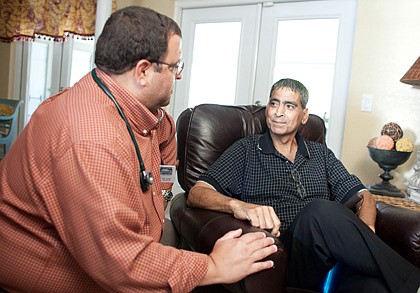- April 24, 2024
-
-
Loading

Loading

Because of a new partnership amongst the Rollins College Philanthropy and Nonprofit Leadership Center, the Community Foundation of Central Florida, and 11 Central Florida law firms, the Business Lawyers' Pro Bono Project is extending a helping hand to nonprofit organizations.
For project starter Gordon Arkin, transactional lawyer and partner at Orlando firm Foley & Lardner, the project is an act of community service that validates what he does, as well as what other lawyers do.
"With this project, we are filling a need in the community where nonprofits can benefit," he said, "while different law firms can get recognition for the community work they do … Law firms do pro bono because it's the right thing to do."
As an avid volunteer in the area for many years, Arkin said that in his 40 years of practicing law it always bothered him that his work was never recognized as pro bono.
After seeing a similar program enacted in Washington, Arkin said he thought one could work here. So he approached Rollins College's Leadership Center and asked if they could coordinate the project.
Margaret Linnane, executive director of the Center, said she agreed immediately after Arkin approached her to coordinate, saying, "I can tell you the nonprofits would so truly appreciate it."
Bambi Hefner, contract administrator for Hospice of the Comforter in Central Florida, couldn't agree more.
Hospice is one of the four clients already utilizing the free legal service program.
"I think it is a great thing for our organization and others to have access to professionals that we may not normally have due to cost constraints," Hefner said.
Doug Stone, vice president of finance for the Center, said $58,000 was spent on legal fees in 2008. Now with the pro bono service being offered, he said that a significant portion of the funds can be deferred into patient care uses.
Stone said the current rate of uninsured patients seen at the Hospice has never been higher.
"The service helps us continue to be good stewards of our financial resources by saving money and putting it into patient care," he said.
With Rollins on board to coordinate, the program will use the Community Foundation's DonorEdge database that features all local, registered nonprofits in order to establish legitimacy.
Upon receiving the free legal assistance, nonprofits will have to fill out a profile through the Foundation's database.
Mark Brewer, president and CEO of the CFCF, said the partnership was "perfect and natural," in that the database could serve as a process to weed out fraudulent organizations trying to take advantage of the program.
Out of the 12 law firms Arkin contacted for the project, 11 agreed to participate, including Holland & Knight; Allen, Dyer, Doppelt, Milbrath & Gilchrist; and Shutts & Bowen LLP.
The program was implemented on a pilot-basis and will run until Sept. 30. The project will then be evaluated based on community need in order to continue.
Eight non-profits are currently in the review process to see if eligibility requirements are met.
With little resistance found to start up the program, Arkin said he sees the pace of requests continuing to grow as he stands off to the side like a proud father.
"It is food for the soul," he said. "It feels good as a supplement to my work."
Visit Rollins.edu for more information about the program.